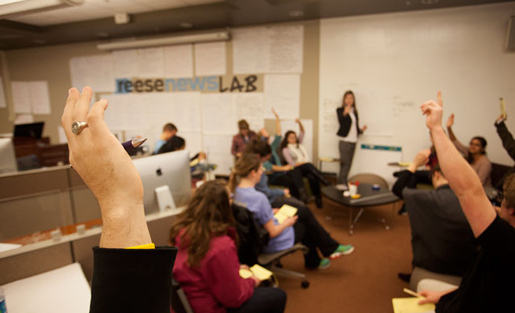A recurring theme at Reese News Lab is our insatiable curiosity. The questions in the Lab are almost never-ending. At every point in our process, there is a need for questions in order to strengthen our ideas. When we start, it’s all about questioning the status quo. Why are things done this way? What are the problems? How can we make it better? We spend this time brainstorming and looking at the media industry in order to ask “why.” We take the answers to these questions in order to refine.![]()
From there, we have to ask questions to figure out if our idea is desirable. We ask target customers questions. We ask industry experts questions. We ask potential investors questions. All of these answers allow us to refine our idea into a final product.
That’s what we’ve been doing so far this semester. Every answer led to a new question, but now we have to compile all of these answers in to a final pitch. A lot of people think of the pitch itself as the most important part of your presentation. However at Reese News Lab, we believe that the question and answer section is far more important.
including ‘data bombs’
Our executive director, John Clark, suggests that we include a few “data bombs” in our pitches in order to get to Q&A. These data bombs are the surprising or compelling facts that engage your audience and make them want to learn more.
Of course, the Lab’s groups don’t go into Q&A cold. While we practice pitching from day one, we start focusing more specifically on our pitches about three weeks before pitch day. After each practice, each group faces an onslaught of questions. The rest of the Lab pokes holes and tries to ask the tough questions. This Q&A has two critical outcomes: ideas to refine the pitches and FAQ sheets.
First, each group uses the questions to learn where their pitch is confusing, or what important facts they are leaving out. Groups can identify the top “data bombs” this way. Also, they learn which stories are most compelling. With all of this information, the groups can refine the pitch.
For example, we started the TourSync pitch last week with a story from a user. TourSync is an idea my team has for a new way museums to provide guided walking tours. Our recent pitch covered all of the problems we saw with the old museum audio tour system. It was perfect, or so we thought. After we pitched however, we find that it made the problem unclear, and people were confused because they wanted us to get to the point. Through Q&A, we identified the most compelling problem we solve for users: TourSync eliminates the need to use dirty, impersonal audio devices that look like cellphones from the 80s.
Beside refining our pitch, the Q&A helped us develop a list of FAQs. Some of these we realized are questions that need to answer during our pitch. However, some of the questions are the topics that we want people to ask about in Q&A. By developing the FAQ, we will be better prepared with our answers, and ultimately, we can throw out even more data bombs after the pitch, which helps us avoid bogging the pitch down with numbers.
At the end of a semester, our curiosity may not be satiated, and we may have outstanding questions. However, the process of using questions to refine our ideas helps us improve what we already have. It makes the final product stronger, and its these products that we want to launch in order to prove there’s money in media.
Lincoln Pennington is a junior in the journalism school at UNC Chapel Hill with a second major in political science. He works as a staffer for reesenews.org and tweets from @Lincoln_Ross. He is a politics junkie interested in the future of the media and hopes to work in D.C. upon graduation in 2016.
This story originally appeared on Reese News Lab.
![]() Reese News Lab is an experimental news and research project based at the School of Journalism and Mass Communication at the University of North Carolina at Chapel Hill. The lab was established in 2010 with a gift from the estate of journalism school alum Reese Felts. The Lab develops and tests new ideas for the media industry in the form of a “pre-startup.” Teams of students research ideas for media products by answering three questions: Can it be done? Does anyone actually need this? Could it sustain itself financially? To answer these questions, students create prototypes, interview and survey potential customers, and develop business strategies for their products. Students document their recommendations on whether they believe a product will work and then present their ideas to the public.
Reese News Lab is an experimental news and research project based at the School of Journalism and Mass Communication at the University of North Carolina at Chapel Hill. The lab was established in 2010 with a gift from the estate of journalism school alum Reese Felts. The Lab develops and tests new ideas for the media industry in the form of a “pre-startup.” Teams of students research ideas for media products by answering three questions: Can it be done? Does anyone actually need this? Could it sustain itself financially? To answer these questions, students create prototypes, interview and survey potential customers, and develop business strategies for their products. Students document their recommendations on whether they believe a product will work and then present their ideas to the public.

